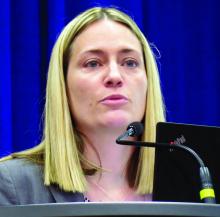SAN ANTONIO – Women with localized breast cancer who achieve a pathological complete response (pCR) after neoadjuvant chemotherapy may be able to safely skip adjuvant chemotherapy, suggest new data from a patient-level meta-analysis reported in a session and press conference at the San Antonio Breast Cancer Symposium.
“The focus of many breast cancer trials for several years has been on adding additional systemic therapies to reduce recurrence risk. However, adding therapies can result in additional toxicity and overtreatment for many patients,” noted lead investigator Laura M. Spring, MD, of Massachusetts General Hospital Cancer Center and Harvard Medical School, both in Boston. “The neoadjuvant chemotherapy model offers several additional clinical and research advantages over adjuvant chemotherapy, including the rapid evaluation of treatment response utilizing surrogate biomarkers, such as pathological complete response.”
The meta-analysis of 52 studies, which included a total of 27,895 women who were given neoadjuvant chemotherapy, confirmed a large positive prognostic effect of pCR on outcomes in the entire sample, with a 69% relative reduction in event-free survival (EFS) events and a 78% relative reduction in risk of death, a pattern that was consistent across clinical subtypes of breast cancer. More importantly, among those achieving a pCR, EFS did not differ significantly whether they went on to receive more chemotherapy after surgery or not.
“Achieving pCR following neoadjuvant chemotherapy is associated with significantly improved EFS and overall survival, particularly for triple-negative and HER2-positive breast cancer. The results are highly significant despite inclusion of a variety of neoadjuvant regimens, suggesting the path taken to attain a pCR may not be critical,” Dr. Spring proposed. “The similar outcomes with or without adjuvant chemotherapy in patients who attained pCR after neoadjuvant chemotherapy likely reflects tumor biology and suggests adjuvant chemotherapy could potentially be omitted in certain circumstances. Further research is needed to evaluate the clinical utility of escalation and de-escalation strategies in the adjuvant setting based on neoadjuvant response.”
“Basically, it appears that the impact of chemotherapy is going to be early, or if you use it early, you really don’t lose the impact [that it has] if you wait until after surgery,” commented SABCS codirector and press conference moderator Carlos Arteaga, MD, director of the Harold C. Simmons Comprehensive Cancer Center and associate dean of Oncology Programs at UT Southwestern Medical Center, Dallas, Texas. “So if it was me, I would have it done before the operation, frankly, because at a minimum, it’s not worse than delaying it until after surgery – at a minimum. And you get the benefit of potential breast conservation, a lesser surgery.”










